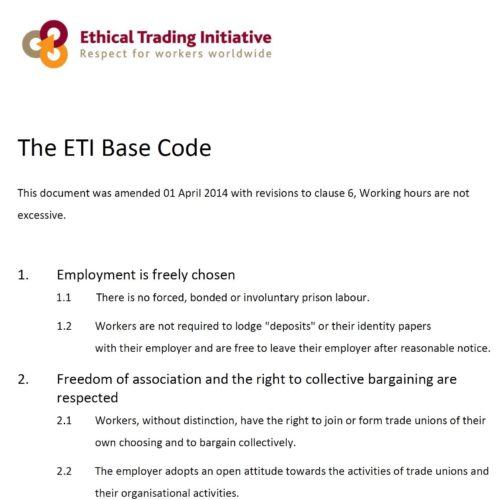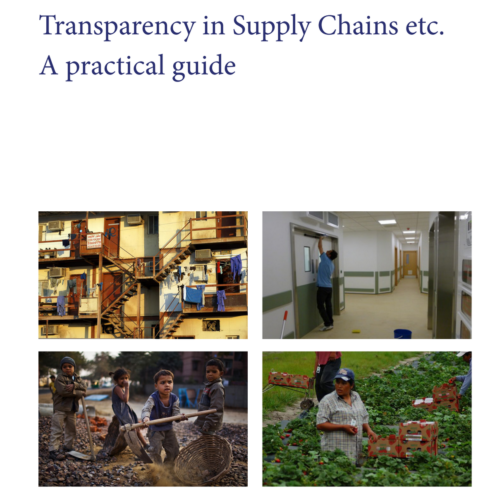-
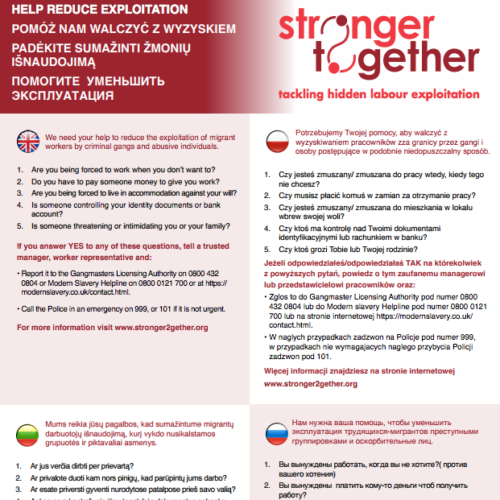 Stronger Together is a multi-stakeholder initiative which aims to reduce modern slavery. It provides guidance, training and resources to organisations, employers, labour providers, workers and their representatives. This free collection of resources includes pragmatic guidance and toolkits, and resources for the workplace including multilingual posters, leaflets and template policies. This leaflet is intended for distribution in the workplace, and asks employees five basic questions to raise awareness of exploitation and encourage those who may be unwittingly exploited to report their abuse. It is published in 8 languages.
Stronger Together is a multi-stakeholder initiative which aims to reduce modern slavery. It provides guidance, training and resources to organisations, employers, labour providers, workers and their representatives. This free collection of resources includes pragmatic guidance and toolkits, and resources for the workplace including multilingual posters, leaflets and template policies. This leaflet is intended for distribution in the workplace, and asks employees five basic questions to raise awareness of exploitation and encourage those who may be unwittingly exploited to report their abuse. It is published in 8 languages. -
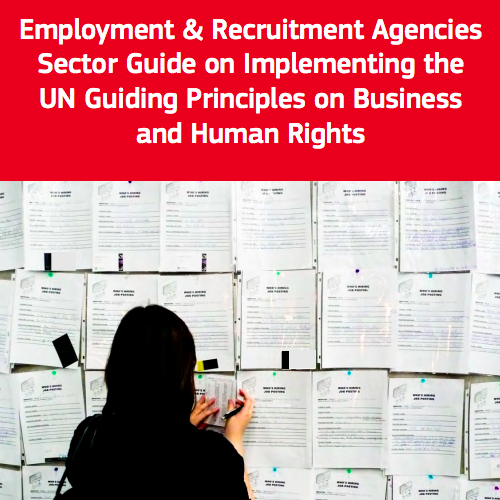 This Guide applies the UN Guiding Principles on Business and Human Rights to the specific context of employment and recruitment agencies. Recognising that each company is different, it is intended to help agencies “translate” respect for human rights into their own systems and company cultures. In December 2011, IHRB and Shift were selected by the European Commission (Directorate-General for Enterprise and Industry) to develop sector-specific guidance on the corporate responsibility to respect human rights, as set out in the UN Guiding Principles on Business and Human Rights.
This Guide applies the UN Guiding Principles on Business and Human Rights to the specific context of employment and recruitment agencies. Recognising that each company is different, it is intended to help agencies “translate” respect for human rights into their own systems and company cultures. In December 2011, IHRB and Shift were selected by the European Commission (Directorate-General for Enterprise and Industry) to develop sector-specific guidance on the corporate responsibility to respect human rights, as set out in the UN Guiding Principles on Business and Human Rights.Credit: Shift & Institute for Human Rights and Business (IHRB)
-
 Stronger Together is a multi-stakeholder initiative which aims to reduce modern slavery. It provides guidance, training and resources to organisations, employers, labour providers, workers and their representatives. This free collection of resources includes pragmatic guidance and toolkits, and resources for the workplace including multilingual posters, leaflets and template policies. This template is to be modified as required and for inclusion with a wider Tackling Modern Slavery in Business and Supply Chain or Business Human Rights Policy.
Stronger Together is a multi-stakeholder initiative which aims to reduce modern slavery. It provides guidance, training and resources to organisations, employers, labour providers, workers and their representatives. This free collection of resources includes pragmatic guidance and toolkits, and resources for the workplace including multilingual posters, leaflets and template policies. This template is to be modified as required and for inclusion with a wider Tackling Modern Slavery in Business and Supply Chain or Business Human Rights Policy.Credit: Stronger Together
-
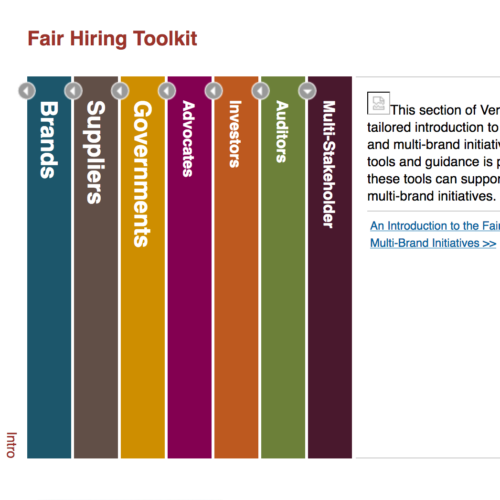 The Fair Hiring Toolkit is a resource which addresses fair hiring practice and responsible recruitment of migrant workers in global supply chains. It focuses on all levels of an organisation to tailor tools and advice appropriately and is a step-by-step process of how to implement trafficking-free supply chains. This includes providing a Framework for Action for brands and suppliers, and supplying guidance for governments, advocates, investors, auditors and other stakeholders. The Frameworks offer advice on: - Improving Codes of Conduct - Raising awareness and building capacity - Strengthening assessments and social audits - Taking corrective action & developing systems improvement plans - Reporting and transparency - Engagement with other actors - Public policy
The Fair Hiring Toolkit is a resource which addresses fair hiring practice and responsible recruitment of migrant workers in global supply chains. It focuses on all levels of an organisation to tailor tools and advice appropriately and is a step-by-step process of how to implement trafficking-free supply chains. This includes providing a Framework for Action for brands and suppliers, and supplying guidance for governments, advocates, investors, auditors and other stakeholders. The Frameworks offer advice on: - Improving Codes of Conduct - Raising awareness and building capacity - Strengthening assessments and social audits - Taking corrective action & developing systems improvement plans - Reporting and transparency - Engagement with other actors - Public policyCredit: Verite
-
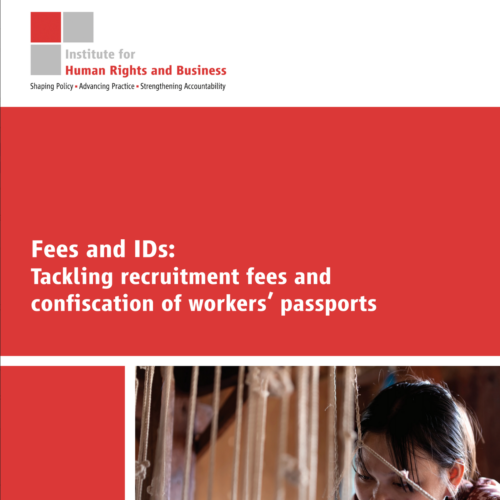 This is a guide produced by the think tank IHRB for tackling the exploitative recruiter practices of charging recruitment fees and confiscation of workers’ practices. The report gives background information regarding the extent of these practices, the current national and international legal frameworks, the business response to the problem and challenges to businesses, and ends with recommendations to businesses.
This is a guide produced by the think tank IHRB for tackling the exploitative recruiter practices of charging recruitment fees and confiscation of workers’ practices. The report gives background information regarding the extent of these practices, the current national and international legal frameworks, the business response to the problem and challenges to businesses, and ends with recommendations to businesses.Credit: Institute for Human Rights and Business (IHRB)
-
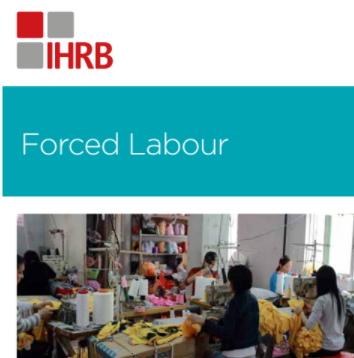 This is a briefing produced by the think tank IHRB on forced labour, its indicators and which industries are particularly affected. It covers how company practice can leave workers vulnerable to modern slavery and lists key standards that work to protect workers against the type of exploitation.
This is a briefing produced by the think tank IHRB on forced labour, its indicators and which industries are particularly affected. It covers how company practice can leave workers vulnerable to modern slavery and lists key standards that work to protect workers against the type of exploitation.Credit: Institute for Human Rights and Business (IHRB)
-
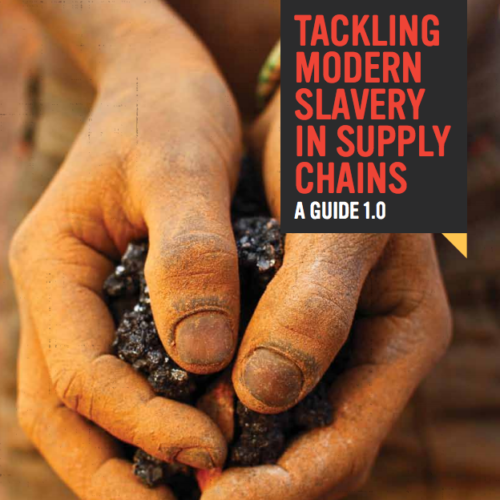 The Walk Free Foundation was established by Andrew Forrest, the Chairman of Fortescue Metals Group, after he found labour exploitation within his own supply chains and took a number of steps to prevent modern slavery affecting his business. This comprehensive guide considers corporate policy on modern slavery and provides both guidance and tools to implement it. It includes advice on corporate policy and provides template examples of a number of tools.
The Walk Free Foundation was established by Andrew Forrest, the Chairman of Fortescue Metals Group, after he found labour exploitation within his own supply chains and took a number of steps to prevent modern slavery affecting his business. This comprehensive guide considers corporate policy on modern slavery and provides both guidance and tools to implement it. It includes advice on corporate policy and provides template examples of a number of tools.Credit: Walk Free Foundation & Verite
-
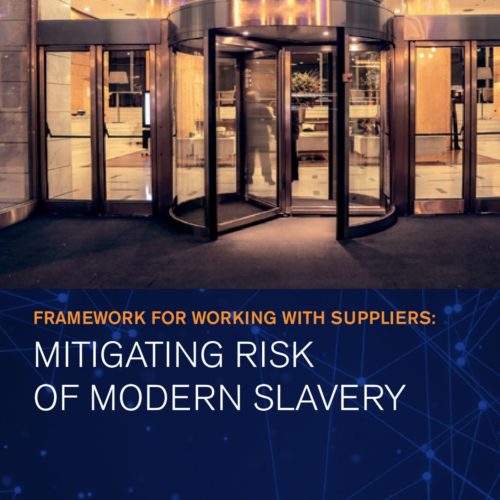 The Framework for Working with Suppliers: Mitigating Risk of Modern Slavery is a tool intended to be used by stakeholders at various levels of management within the hotel industry. It recommends specific responsibilities for brands, hotel owners and management companies, based on best practice and the experience and input of the Stop Slavery Hotel Industry Network (the "Network") membership. The Network brings together representatives from across the hotel industry to combat human trafficking and modern slavery within the sector. Its ethos stems from the acknowledgement that actors across the industry, whether international brands, bespoke hotel groups, independent owners, managers or employee agencies are all responsible for combating this horrific crime.
The Framework for Working with Suppliers: Mitigating Risk of Modern Slavery is a tool intended to be used by stakeholders at various levels of management within the hotel industry. It recommends specific responsibilities for brands, hotel owners and management companies, based on best practice and the experience and input of the Stop Slavery Hotel Industry Network (the "Network") membership. The Network brings together representatives from across the hotel industry to combat human trafficking and modern slavery within the sector. Its ethos stems from the acknowledgement that actors across the industry, whether international brands, bespoke hotel groups, independent owners, managers or employee agencies are all responsible for combating this horrific crime.Credit: Stop Slavery Hotel Industry Network
-
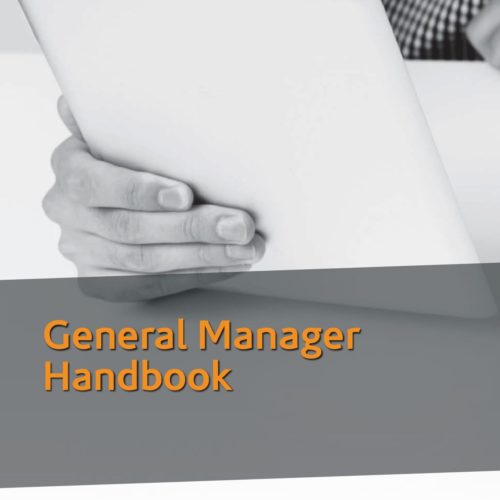 This Handbook is to be used by General Managers in conjunction with the Stop Slavery Blueprint. It offers practical tools to help operationalise the guidance from the Blueprint and provides example documents that can be adapted and used accordingly. The Stop Slavery Blueprint has been created by Shiva Foundation and was initially trialled in a group of hotels, with its implementation coordinated and supported by the Foundation. The Blueprint sets out the key principles for hoteliers wishing to implement their own anti-slavery initiatives.
This Handbook is to be used by General Managers in conjunction with the Stop Slavery Blueprint. It offers practical tools to help operationalise the guidance from the Blueprint and provides example documents that can be adapted and used accordingly. The Stop Slavery Blueprint has been created by Shiva Foundation and was initially trialled in a group of hotels, with its implementation coordinated and supported by the Foundation. The Blueprint sets out the key principles for hoteliers wishing to implement their own anti-slavery initiatives.Credit: Shiva Foundation
-
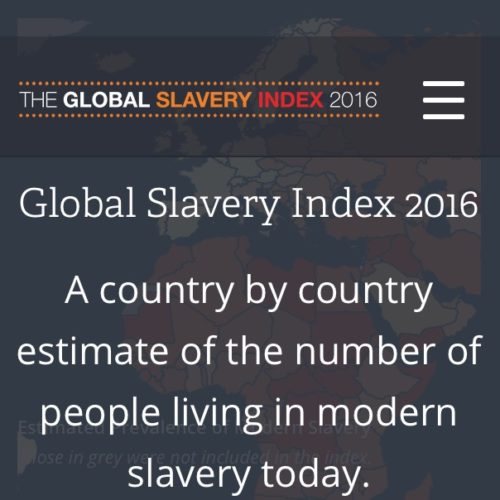 The Global Slavery Index provides a map, country by country, of the estimated prevalence of modern slavery, together with information about the steps each government has taken to respond to this issue. This information allows an objective comparison and assessment of both the problem and adequacy of the response in 167 countries.
The Global Slavery Index provides a map, country by country, of the estimated prevalence of modern slavery, together with information about the steps each government has taken to respond to this issue. This information allows an objective comparison and assessment of both the problem and adequacy of the response in 167 countries.Credit: Walk Free Foundation
-
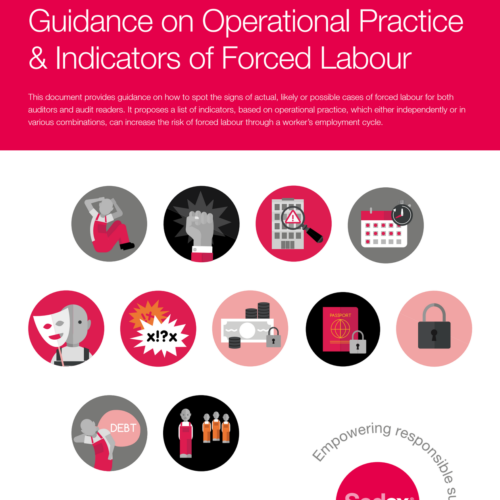 Sedex is a global NGO which provides the world's largest collaborative platform for sharing responsible sourcing data on supply chains. The Sedex Stakeholder Forum (previously the Associated Auditor Group) brings together brings together leaders across the ethical trade and responsible sourcing industry to discuss the challenges they collectively face and solve those problems collaboratively. This guidance provides information on how to spot signs of exploitation for auditors and audit readers. It includes a list of indicators of exploitation, based on operational practice, which can increase a person's risk to human trafficking. It also highlights the importance of protecting potential victims, and advises auditors on how to capture evidence and document potential exploitation of workers. It is intended for use by auditing bodies, ethical sourcing initiatives and brands to help them understand the risks of forced labour, and enhance their existing auditing protocols.
Sedex is a global NGO which provides the world's largest collaborative platform for sharing responsible sourcing data on supply chains. The Sedex Stakeholder Forum (previously the Associated Auditor Group) brings together brings together leaders across the ethical trade and responsible sourcing industry to discuss the challenges they collectively face and solve those problems collaboratively. This guidance provides information on how to spot signs of exploitation for auditors and audit readers. It includes a list of indicators of exploitation, based on operational practice, which can increase a person's risk to human trafficking. It also highlights the importance of protecting potential victims, and advises auditors on how to capture evidence and document potential exploitation of workers. It is intended for use by auditing bodies, ethical sourcing initiatives and brands to help them understand the risks of forced labour, and enhance their existing auditing protocols.Credit: Sedex
-
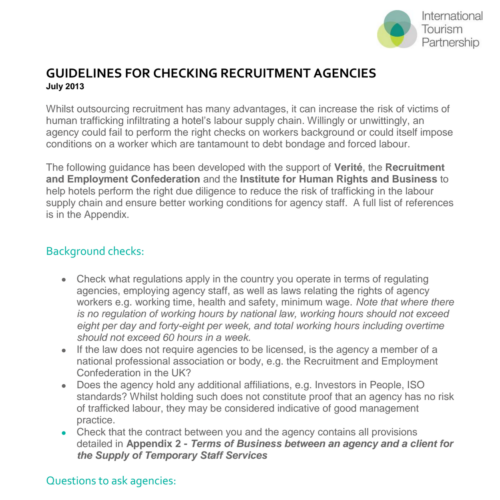 These guidelines were created by the ITP Anti-Trafficking Working Group made up of major hotel brands. This was done in consultation with Verite, the Recruitment and Employment Federation, and the Institute for Human Rights and Business. The guidelines include examples of conducting background checks on agencies, questions to ask agencies, document checks, and guidance on contracting. This resource gives examples of: - “Good Recruitment Charter” - Detailed Guidelines for Establishing Terms and Conditions with Recruitment Agencies
These guidelines were created by the ITP Anti-Trafficking Working Group made up of major hotel brands. This was done in consultation with Verite, the Recruitment and Employment Federation, and the Institute for Human Rights and Business. The guidelines include examples of conducting background checks on agencies, questions to ask agencies, document checks, and guidance on contracting. This resource gives examples of: - “Good Recruitment Charter” - Detailed Guidelines for Establishing Terms and Conditions with Recruitment AgenciesCredit: International Tourism Partnership
-
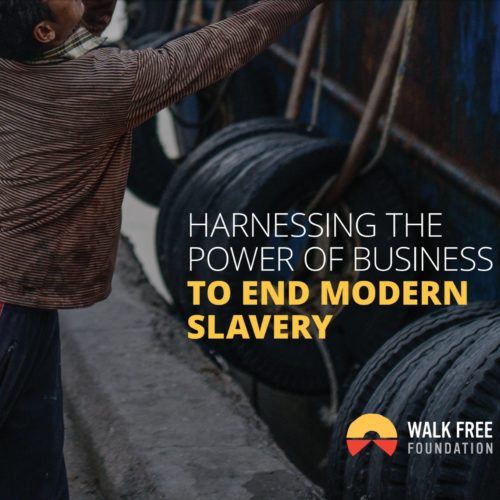 The Walk Free Foundation was established by Andrew Forrest, the Chairman of Fortescue Metals Group, after he found labour exploitation within his own supply chains and took a number of steps to prevent modern slavery affecting his business. This report provides an overview of modern slavery in a global context with statistics, case studies, and review of legislation and policy.
The Walk Free Foundation was established by Andrew Forrest, the Chairman of Fortescue Metals Group, after he found labour exploitation within his own supply chains and took a number of steps to prevent modern slavery affecting his business. This report provides an overview of modern slavery in a global context with statistics, case studies, and review of legislation and policy.Credit: Walk Free Foundation
-
 Hedging Risk by Combating Human Trafficking: Insights from the Private Sector is designed to help companies share best practices so they can mitigate their risks and help eliminate this heinous practice. In this first of a series, we highlight insights and technology-driven interventions in the hospitality, finance, and transportation industries.
Hedging Risk by Combating Human Trafficking: Insights from the Private Sector is designed to help companies share best practices so they can mitigate their risks and help eliminate this heinous practice. In this first of a series, we highlight insights and technology-driven interventions in the hospitality, finance, and transportation industries.Credit: World Economic Forum

